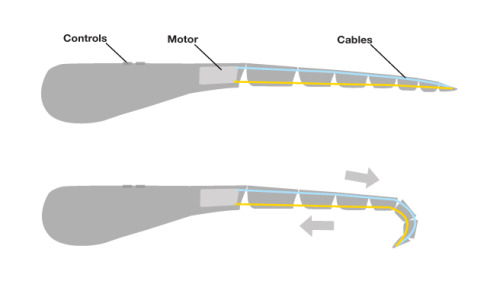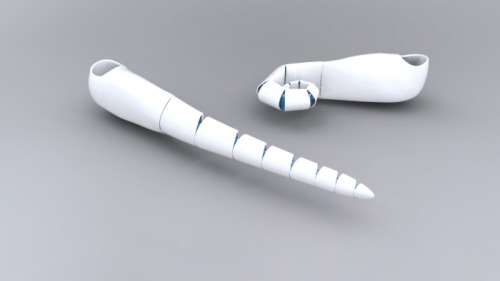A Full Day From Space (x-post Woahdude)

a full day from space (x-post woahdude)
Source: https://imgur.com/mOpsxQu
More Posts from Curiositytherover and Others

Following cancer with tiny magnets
Life-saving surgery and treatments rely on doctors being able to accurately track the spread of cancers.
A new device that uses iron particles and a magnetic probe will allow clinicians to narrow down exactly which lymph nodes tumours spread to.
Developed by Aidan Cousins with colleagues at the University of South Australia, the novel approach is more sensitive and safer than existing methods for monitoring cancer.
“Pre-clinical trials of our approach suggest it gives a very clear picture of where tumours are most likely to spread,” Aidan explained.
“It will allow subsequent surgery and treatment options to be refined for better standards of care and improved prognosis.”
The technique involves injecting biodegradable iron particles at the primary site of a tumour, from where – as part of their normal surveillance activities – cells of the immune system transport them to the draining lymph nodes.
More information: A. Cousins et al. Novel Handheld Magnetometer Probe Based on Magnetic Tunnelling Junction Sensors for Intraoperative Sentinel Lymph Node Identification, Scientific Reports (2015). DOI: 10.1038/srep10842
Electron microscopic image of a single human lymphocyte. Credit: Dr. Triche National Cancer Institute

Perseids over Moosehorn Lake, Utah
Credit: Eric Benedetti
We’re With You When You Fly

Did you know that “We’re With You When You Fly”? Thanks to our advancements in aeronautics, today’s aviation industry is better equipped than ever to safely and efficiently transport millions of passengers and billions of dollars worth of freight to their destinations. In fact, every U.S. Aircraft flying today and every U.S. air traffic control tower uses NASA-developed technology in some way. Here are some of our objectives in aeronautics:
Making Flight Greener

From reducing fuel emissions to making more efficient flight routes, we’re working to make flight greener. We are dedicated to improving the design of airplanes so they are more Earth friendly by using less fuel, generating less pollution and reducing noise levels far below where they are today.
Getting you safely home faster

We work with the Federal Aviation Administration to provide air traffic controllers with new tools for safely managing the expected growth in air traffic across the nation. For example, testing continues on a tool that controllers and pilots can use to find a more efficient way around bad weather, saving thousands of pounds of fuel and an average of 27 minutes flying time per tested flight. These and other NASA-developed tools help get you home faster and support a safe, efficient airspace.
Seeing Aviation’s Future

Here at NASA, we’re committed to transforming aviation through cutting edge research and development. From potential airplanes that could be the first to fly on Mars, to testing a concept of a battery-powered plane, we’re always thinking of what the future of aviation will look like.
Make sure to follow us on Tumblr for your regular dose of space: http://nasa.tumblr.com

First sketch of Copenhagen Suborbitals’ SPICA capsule. They aim to be the first amateur organization to send a man to space.
via reddit

Microsoft Creates Emotion Recognition Tool. Upload Your Image and Give It a Try
Project Oxford is Microsoft’s collection of machine-learning application programming interfaces (APIs). Now the tech giant can add emotion recognition to its API portfolio.
Note: This one was also a little off. I tried to give it an easy one (surprise). But apparently, Project Oxford thinks that I am judgy and filled with scorn.
Read more at: http://futurism.com/links/microsoft-creates-emotion-recognition-tool-upload-your-image-and-give-it-a-try/

Glowing bandages can reduce the chances of antibiotic-resistant bugs

Fusion Energy: These Promising Projects Are Set to Revolutionize Our World
Fusion power would completely revolutionize energy production on our planet. Indeed, it would reshape our entire world, allowing us to produce vast amounts of energy with little waste or cost. In essence, fusion reactors work by mimicking our Sun in that they fuse two hydrogen atoms into a single helium atom. Conversely, nuclear fission breaks a single atom into two atoms.
Ultimately, the fusion reaction releases ten times more energy per mass as our regular fission reactors, and it does so without all the harmful nuclear waste.
Unfortunately, such reactions come with a few problems. As University of Texas physicist Dr. Swadesh M. Mahajan notes, “Getting net energy from fusion is such a goddamn difficult undertaking. We know of no materials that would be able to handle anywhere near that amount of heat.”
Find out how scientists tackled that issue at: http://futurism.com/links/fusion-energy-these-promising-projects-are-set-to-revolutionize-our-world/







HOW DID I NOT KNOW THIS?!

Is the End of Daily Insulin Injections for Diabetes Sufferers in Sight?
A new study reportedly shows that boosting the immune system can safely restore insulin production for up to a year—which might make it possible for those who suffer with diabetes to not require daily injections. Notably, these are Phase 1 trials, which are designed to look at safety, not long term effectiveness. So much research is still needed.
Yet, if the technique proves viable and effective, this could change the lives of millions of people around the world. According to the Center for Diseases Control, in the United States alone, 29.1 million people (or 9.3% of the population) have diabetes. That’s one out of every 11 people. 371 million people worldwide have this condition.
To break down the research, those afflicted with Type 1 diabetes do not have enough T-regs or ‘peacekeeping’ cells, which is ultimately what causes the disease. Researchers from Yale and University of California have just showed that T-regs can be removed from the body, increased by 1,500 in a lab setting, and then placed back into the bloodstream as a way of potentially restoring the body’s insulin production back to normal.
Find out more at: http://futurism.com/links/end-daily-insulin-injections-diabetes-sufferers-sight/
-
 jac374 reblogged this · 1 month ago
jac374 reblogged this · 1 month ago -
 jac374 liked this · 1 month ago
jac374 liked this · 1 month ago -
 piratelounge reblogged this · 1 month ago
piratelounge reblogged this · 1 month ago -
 gypsymoon548 liked this · 2 months ago
gypsymoon548 liked this · 2 months ago -
 metamorphs-blog liked this · 2 months ago
metamorphs-blog liked this · 2 months ago -
 naturalwondersandbeauty reblogged this · 2 months ago
naturalwondersandbeauty reblogged this · 2 months ago -
 bruno3173 liked this · 2 months ago
bruno3173 liked this · 2 months ago -
 soulful-samurai liked this · 2 months ago
soulful-samurai liked this · 2 months ago -
 silvias-seite liked this · 2 months ago
silvias-seite liked this · 2 months ago -
 life-goes-ons-stuff reblogged this · 2 months ago
life-goes-ons-stuff reblogged this · 2 months ago -
 life-goes-ons-stuff liked this · 2 months ago
life-goes-ons-stuff liked this · 2 months ago -
 gloria-glitter reblogged this · 2 months ago
gloria-glitter reblogged this · 2 months ago -
 bonitalia reblogged this · 2 months ago
bonitalia reblogged this · 2 months ago -
 souluanarodrigues liked this · 2 years ago
souluanarodrigues liked this · 2 years ago -
 kunlinchou-blog liked this · 2 years ago
kunlinchou-blog liked this · 2 years ago -
 ferndfern liked this · 2 years ago
ferndfern liked this · 2 years ago -
 gloria-glitter liked this · 3 years ago
gloria-glitter liked this · 3 years ago -
 aromantichopeless liked this · 3 years ago
aromantichopeless liked this · 3 years ago -
 omgspinneruniverse reblogged this · 3 years ago
omgspinneruniverse reblogged this · 3 years ago -
 yahveh-nissi reblogged this · 3 years ago
yahveh-nissi reblogged this · 3 years ago -
 yahveh-el-olam liked this · 3 years ago
yahveh-el-olam liked this · 3 years ago -
 justasoullookingfortheirheart reblogged this · 3 years ago
justasoullookingfortheirheart reblogged this · 3 years ago -
 justasoullookingfortheirheart liked this · 3 years ago
justasoullookingfortheirheart liked this · 3 years ago -
 txtokenman liked this · 3 years ago
txtokenman liked this · 3 years ago -
 bonitalia reblogged this · 4 years ago
bonitalia reblogged this · 4 years ago -
 tenigam liked this · 4 years ago
tenigam liked this · 4 years ago -
 chelypain liked this · 4 years ago
chelypain liked this · 4 years ago -
 cromamon liked this · 4 years ago
cromamon liked this · 4 years ago